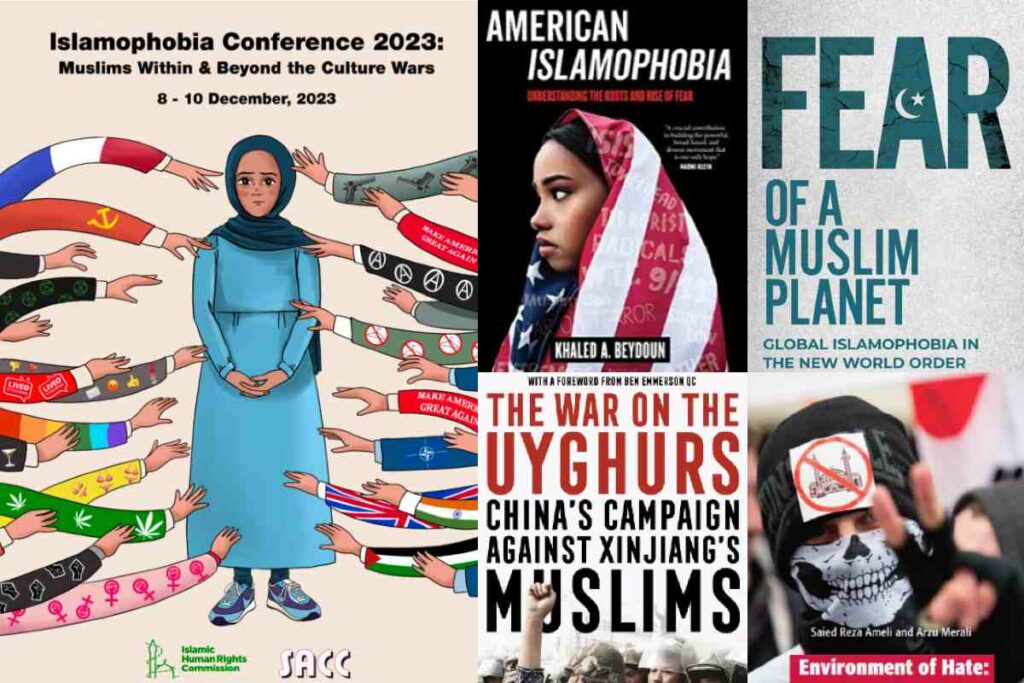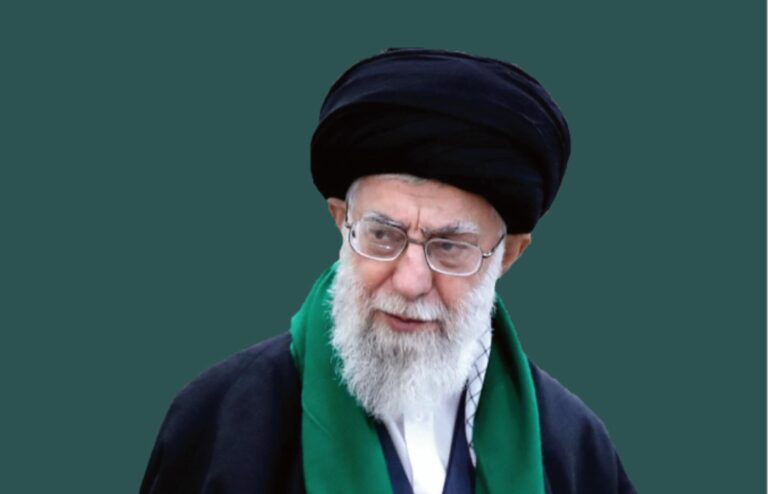Since its conception in 2012, every November has marked Islamophobia Awareness Month (IAM). IAM is a campaign dedicated to highlighting the prevalence of Islamophobic prejudice in British society. Yet, it also aims to challenge the stereotypes surrounding Muslims by showcasing the positive contributions that they have made, and continue to make, to our society. We have a few announcements for you.
Islamophobia Conference 2023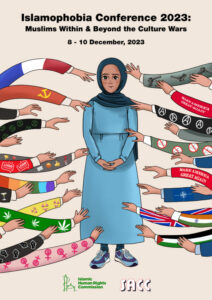
This year’s annual Islamophobia Conference will discuss ‘Muslims within & beyond the Culture wars’. The conference will bring together experts in the field over the course of three days for online and in-person discussions:
- Friday 8 December: Plenary with Professor Joseph Massad, 18:30 GMT, IHRC Bookshop and online – book tickets here
- Saturday 9 December: Panel 1 and 2, 10:30 to 16:30 GMT, P21 Gallery (Chalton St, London NW1 1JD) – book tickets here (available soon)
- Sunday 10 December: Panel 3 and 4, 11:30 to 16:30 GMT, online
- Links to watch and join the conversation online will be available soon.
Session topics:
- Panel 1: The Culture Spectrum: From the Hijab ban to the Muslim ban
- Panel 2: Left or Right: What is the Muslim Perspective?
- Panel 3: Digital Culture Wars
- Panel 4: To Engage or Disengage: The Liberalists, The Conservative, and the Muslim
Confirmed speakers:
Professor Joseph Massad, Sandew Hira, Jasmin Zine, Ilan Pappé, Sadek Hamid, Nargess Moballeghi, Professor Ramón Grosoguel, Professor Saeed Khan and others.
Donate generously and help the oppressed
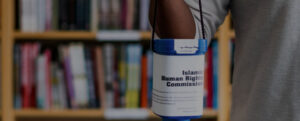 In the Qur’an Allah says “be just, that is closest to Godliness“. This is a mission that the Islamic Human Rights Commission Trust wears on its sleeves. As Muslims, we believe that Allah has firmly commanded us to establish justice. The services that we provide through the trust has been the safety net the community has relied on since 2003.
In the Qur’an Allah says “be just, that is closest to Godliness“. This is a mission that the Islamic Human Rights Commission Trust wears on its sleeves. As Muslims, we believe that Allah has firmly commanded us to establish justice. The services that we provide through the trust has been the safety net the community has relied on since 2003.
Over the years we have been working in the background supporting the silent victims of Islamophobia and hate crime. Just as we have been monitoring and supporting victims here at our doorstep, we have not taken our eyes off international issues. We have always monitored human rights abuses, and where needed we also followed it up with humanitarian assistance where causes have been neglected by everyone else.
We are the only organisation to have given assistance to victims of sectarian violence in Indonesia. In Nigeria, we are the only authorised and charity of choice to aid the victims of government oppression against Muslims in Nigeria. Whether it be the Uighurs or the Rohingya, we were at the forefront of carrying out research through investigative journalists.
Our Hate Crime research on various countries is now the go to place for the latest in statistics and understanding trends. Civil rights activists, civil society organisations, academics and government bodies all refer to our work. Your generous donations will help fund our Hate Crime research. Click below to donate.
THROWBACK – Author Evening with Rob Faure Walker: The Emergence of ‘Extremism’
On 12 October 2021, IHRC hosted an online author evening with Rob Faure Walker who promoted his publication, The Emergence of ‘Extremism’. Click below to watch the recording.
Informed by his own experience with the UK’s Prevent programme while teaching in a Muslim community, Rob Faure Walker explores the linguistic emergence of ‘extremism’ in political discourse and the potentially damaging generative effect of this language.
Rob Faure Walker is Senior Researcher in the Corridors of Power project at SOAS, University of London, UK. He holds a PhD from IOE, UCL’s Faculty of Education and Society, University College London, UK and was a secondary school teacher.
Below are Islamophobia-related books that are available at IHRC Bookshop:
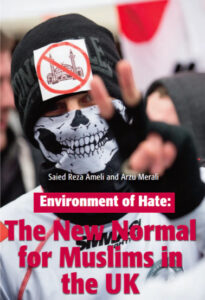 Environment of Hate: The New Normal for Muslims in the UK
Environment of Hate: The New Normal for Muslims in the UK
This report provides shocking insight into the UK as an ever developing ‘Stasi state’ rife with hatred for the ‘suspect’ Muslim community. With analysis at every level – from grassroots to institutions – the authors examine the construction of an environment where Muslims are feared and loathed. The authors have implemented the Domination Hate Model of Intercultural Relations – a critical methodology that argues that hate crimes do not occur in a vacuum.
Perpetrators are themselves victim citizens who have been mobilised by structural forces; namely the government and the media. Both perpetrator and victim alike are at the mercy of a broader context of hate policy, hate representation and hate environment.
Taking us back to pre-9/11, the report acknowledges that even then Muslims were seen as exotic, different and a threat to national security. The state is seen as neutral and embodying Britishness and citizens of the state are only defined by their adherence to this specific national identity. Through devoted analysis to the PREVENT strategy and the Channel programme, the authors detail the way surveillance focused specifically on Muslims means they are assumed guilty of terrorism by association. With an overview of headlines in popular media, the report showcases embedded stereotypes and coded discriminatory language. The Muslim minority becomes victim to the social attitudes of the majority – learned through government policy and the media they consume – and this is then expressed in acts of hatred, hostility and violence.
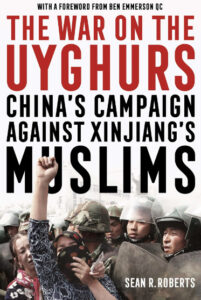 The War on the Uyghurs: China’s Campaign Against Xinjiang’s Muslims – Sean R. Roberts
The War on the Uyghurs: China’s Campaign Against Xinjiang’s Muslims – Sean R. Roberts
The first account of one of the world’s most pressing humanitarian catastrophes. This eye-opening book reveals how China has used the US-led Global War on Terror as cover for its increasingly brutal suppression of the Uyghur / Uighur people. China’s actions, it argues, have emboldened states around the globe to persecute ethnic minorities and severely repress domestic opposition in the name of combatting terrorism.
Within weeks of the September 11 attacks on New York and Washington, the Chinese government announced that it faced a serious terrorist threat from its largely Muslim Uyghur ethnic minority. Nearly two decades later, of the 11 million Uyghurs living in China today, more than 1 million have been detained in so-called re-education camps, victims of what has become the largest program of mass incarceration and surveillance in the world.
Drawing on extensive interviews with Uyghurs in Xinjiang, as well as refugee communities and exiles, Sean Roberts tells a story that is not just about state policies, but about Uyghur responses to these devastating government programs. Providing a lucid and far-reaching analysis of China’s cultural genocide, The War on the Uyghurs allows the voices of those caught up in the human tragedy to be heard for the first time.
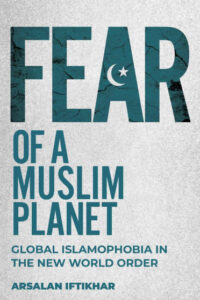 Fear of a Muslim Planet: Global Islamophobia in the New World Order – Arsalan Iftikhar
Fear of a Muslim Planet: Global Islamophobia in the New World Order – Arsalan Iftikhar
Fear of a Muslim Planet begins with the treacherous legacy of the white supremacist “Great Replacement” theory in the aftermath of the Christchurch massacre. One of the heroes for the Christchurch shooter was the infamous Norwegian anti-Muslim terrorist named Anders Breivik, who brutally murdered seventy-seven people in 2011 in Norway’s worst terrorist attack ever.
As the book further illustrates, minority victims of the “Great Replacement” conspiracy theory are not limited to Muslims alone. The book will also show that Islamophobia is not simply an American (or Western) problem either. Fear of a Muslim Planet will show the genocidal levels of Islamophobia in places like China and Myanmar. The European fixation on policing Muslim women’s hijab (headscarf) is another focal point. The book ends with a clarion call for mutual understanding and coexistence among people of all backgrounds, if we have the courage to summon our better selves and look beyond each other’s race, religion, and ethnic backgrounds.
The Myths of Liberal Zionism – Yitzhak Laor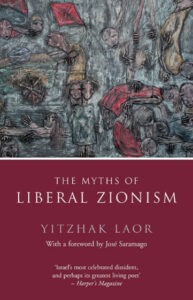
Yitzhak Laor is one of Israel’s most prominent dissidents and poets, a latter-day Spinoza who helps keep alive the critical tradition within Jewish culture. In this work he fearlessly dissects the complex attitudes of Western European liberal Left intellectuals toward Israel, Zionism and the ‘Israeli peace camp.’ He argues that through a prism of famous writers like Amos Oz, David Grossman and A.B. Yehoshua, the peace camp has now adopted the European vision of ‘new Zionism,’ promoting the fierce Israeli desire to be accepted as part of the West and taking advantage of growing Islamophobia across Europe. The backdrop to this uneasy relationship is the ever-present shadow of the Holocaust. Laor is merciless as he strips bare the hypocrisies and unarticulated fantasies that lie beneath the love-affair between ‘liberal Zionists’ and their European supporters.
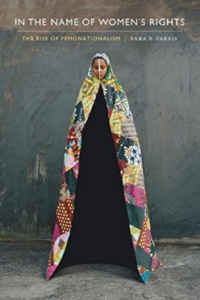 In The Name of Women’s Rights: The Rise of Femonationalism – Sara R. Farris
In The Name of Women’s Rights: The Rise of Femonationalism – Sara R. Farris
Sara R. Farris examines the demands for women’s rights from an unlikely collection of right-wing nationalist political parties, neoliberals, and some feminist theorists and policy makers. Focusing on contemporary France, Italy, and the Netherlands, Farris labels this exploitation and co-optation of feminist themes by anti-Islam and xenophobic campaigns as “femonationalism.”
She shows that by characterizing Muslim males as dangerous to western societies and as oppressors of women, and by emphasizing the need to rescue Muslim and migrant women, these groups use gender equality to justify their racist rhetoric and policies. This practice also serves an economic function. Farris analyzes how neoliberal civic integration policies and feminist groups funnel Muslim and non-western migrant women into the segregating domestic and caregiving industries, all the while claiming to promote their emancipation. In the Name of Women’s Rights documents the links between racism, feminism, and the ways in which non-western women are instrumentalized for a variety of political and economic purposes.
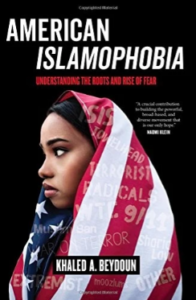 American Islamophobia: Understanding the Roots and Rise of Fear – Khaled A. Beydoun
American Islamophobia: Understanding the Roots and Rise of Fear – Khaled A. Beydoun
Using his unique lens as a critical race theorist and law professor, Khaled A. Beydoun captures the many ways in which law, policy, and official state rhetoric have fueled the frightening resurgence of Islamophobia in the United States.
Beydoun charts its long and terrible history, from the plight of enslaved African Muslims in the antebellum South and the laws prohibiting Muslim immigrants from becoming citizens to the ways the war on terror assigns blame for any terrorist act to Islam and the myriad trials Muslim Americans face in the Trump era. He passionately argues that by failing to frame Islamophobia as a system of bigotry endorsed and emboldened by law and carried out by government actors, U.S. society ignores the injury it inflicts on both Muslims and non-Muslims.
Through the stories of Muslim Americans who have experienced Islamophobia across various racial, ethnic, and socioeconomic lines, Beydoun shares how U.S. laws shatter lives, whether directly or inadvertently. And with an eye toward benefiting society as a whole, he recommends ways for Muslim Americans and their allies to build coalitions with other groups. Like no book before it, American Islamophobia offers a robust and genuine portrait of Muslim America then and now.
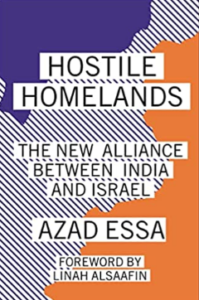 Hostile Homelands: The New Alliance Between India and Israel – Azad Essa
Hostile Homelands: The New Alliance Between India and Israel – Azad Essa
Under Narendra Modi, India has changed dramatically. As the world attempts to grapple with its trajectory towards authoritarianism and a ‘Hindu Rashtra’ (Hindu State), little attention has been paid to the linkages between Modi’s India and the governments from which it has drawn inspiration, as well as military and technical support.
India once called Zionism racism, but, as Azad Essa argues, the state of Israel has increasingly become a cornerstone of India’s foreign policy. Looking to replicate the ‘ethnic state’ in the image of Israel in policy and practice, the annexation of Kashmir increasingly resembles Israel’s settler-colonial project of the occupied West Bank. The ideological and political linkages between the two states are alarming; their brands of ethnonationalism deeply intertwined.
Hostile Homelands puts India’s relationship with Israel in its historical context, looking at the origins of Zionism and Hindutva; India’s changing position on Palestine; and the countries’ growing military-industrial relationship from the 1990s. Lucid and persuasive, Essa demonstrates that the India-Israel alliance spells significant consequences for democracy, the rule of law and justice worldwide.
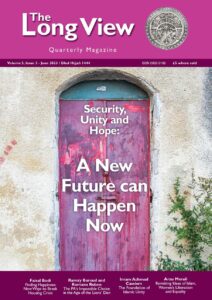 Read: The Long View Vol 5, Issue 3: Security, Unity and Hope: A New Future Can Happen Now
Read: The Long View Vol 5, Issue 3: Security, Unity and Hope: A New Future Can Happen Now
In our lead article, Faisal Bodi looks at the dearth of halal housing options in the UK and by extension other Western countries. The obstacles that prevent Palestinians from enjoying these and other basic rights are the subjects of Ramzy Baroud and Romana Rubeo’s piece. In particular, they analyse the trajectory of the Palestinian Authority (PA), as its standing as anything other than an enforcer of Israeli apartheid.
Imam Achmad Cassiem’s piece is an extract from his book, The Quest for Unity. In it, he uses Quranic ayaat and hadith to emphasise the obligation of unity between Muslims. Our final piece from Arzu Merali is a reflection on her journey as a writer and activist for women’s rights.

